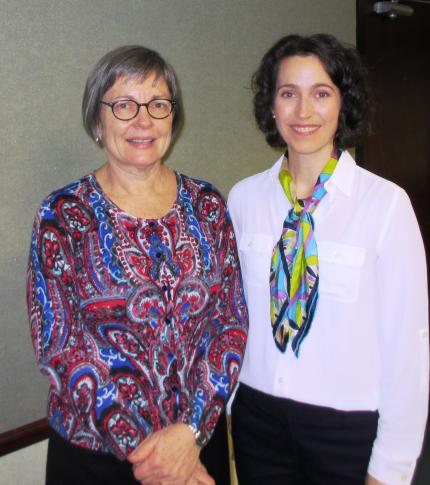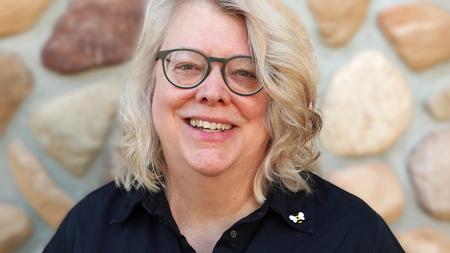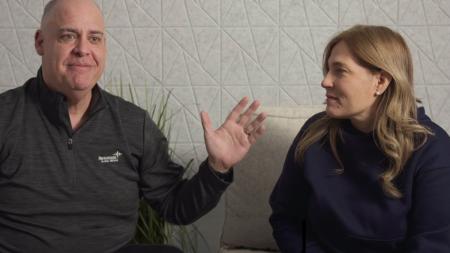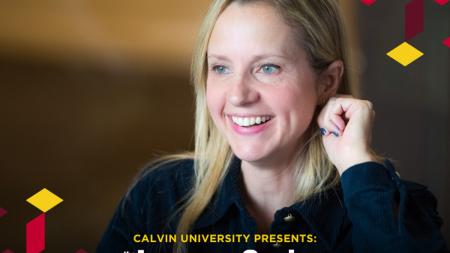Building Safe Places for People in Pain

Harriet Hill (left) and Dana Ergenbright
Dana Ergenbright recalls hearing the pastor from rural Rwanda talk about losing nearly 100 members of his immediate and extended family in the Rwandan genocide of the early 1990s.
As devastating this was, the pastor eventually began down the path of forgiveness, to the point where he could pass one of the killers on the street and offer a greeting, said Ergenbright, a trauma healing manger for the Trauma Healing Institute, which is affiliated with the American Bible Society.
“When I heard him talk, it was hard for me to wrap my mind around what happened to him,” said Ergenbright, who recently helped put on a trauma healing presentation at the Grand Rapids, Mich. office of the Christian Reformed Church.
“But I heard him share how he was able to bring his pain to God and how he was able to start to forgive and how he was then able to pass that on to others.”
World Renew, which has used the institute over the last decade to train some of its field staff to work in trauma healing overseas, brought in Ergenbright and Harried Hill, program director of the institute, to offer the presentation.
“When the American Bible Society contacted World Renew with their desire to bring trauma healing training to the North American context, I knew that World Renew should be a part of that work,” said Carol Bremer-Bennett, director of World Renew U.S.
The presentation drew to about 30 people, including those who work for Disaster Response Services, other CRC agencies and West Michigan area churches and ministries.
“World Renew has a core commitment to justice; when injustice occurs, there is a deep brokenness that only Jesus can heal completely. I know that other agencies and ministries also desire to enter into people's lives in these difficult places and so I invited as many as the room could fit for the convening session,” said Bremer-Bennett.
For those interested, World Renew will be making formal training sessions available in future months. Contact [email protected] to be added to email updates.
The Trauma Healing Institute, which is based in Philadelphia, Penn., works with Bible societies, NGOs, and churches worldwide to provide materials, program models, facilitator certification and research. It is now extending its efforts in North America.
During the presentation in Grand Rapids, Harriet Hill presented the group’s approach to Bible-based trauma care, which helps facilitators to bring together and equip healing groups, creates communities which practice trauma healing and stay connected with others for support.
“If you look at the news for one night, you are aware of how the world is going,” she said. “We see a great deal of darkness. But the darkness never extinguishes the light.”
Underlying their work, said Hill, is the desire to bring the light of Christ into the lives of those who are hurting. “This is salvation when Jesus heals that pain and grief. This is the gospel.”
One of the places in which they have worked, said Hill, is the Democratic Republic of Congo, where years of war tore apart the country and led to the loss of thousands of lives.
Using their scriptural approach to trauma care, they began working in 2011 with nearly 600,000 people in towns, hospitals, prisons and the military across the country .
A 2014 survey found that a large majority of people who went through the institute’s program showed “renewed interest in life and an end to feelings of isolation.”
To view a documentary about the work in Congo, visit Hope Rising.
“Our program, which mixes biblical with mental health principles, travels well across different churches and cultures,” said Ergenbright.
They teach facilitators exercises and methods to use that address the special situations and circumstances in the countries in which they find themselves.
“We train facilitators to know how to develop an environment in which people can come and speak their truth,” said Ergenbright. “We work with them so they know how to help people and not cause further damage.”
In many ways, they bring a theology of suffering with them in the work, said Hill. “We want to help people make sense of what happened to them. Often, they are asking ‘if God loves us, why do we suffer?’”
Answering this question is not easy, but it is essential to try by asking a person to talk through their story and, when they are ready, to bring their suffering — often in the form of a ceremony — and lay it at the foot of the cross.
“This is where Jesus died for our sins and to heal of the wounds of our hearts,” said Hill.
But it is important to realize that bringing one’s pain to the cross of Christ usually has to happen again and again as part of the healing process -- a process whose goal is relief from suffering and even forgiveness, said Hill.
“When there is severe trauma and injustice, healing and forgiveness won’t happen overnight,” she said. “This is not magic. We have to set aside the necessary time for whatever it takes for God to heal us of the wounds we are carrying.”


